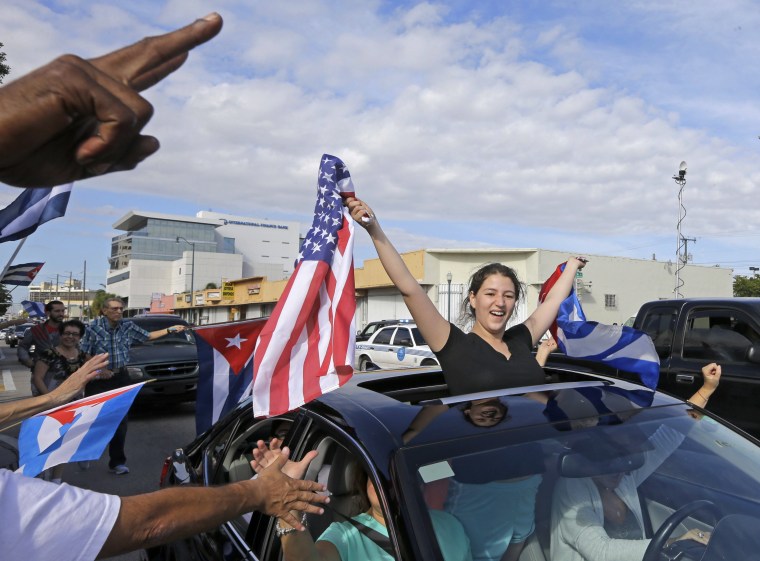The death of Fidel Castro brought a wave of reactions from Cuban-American politicians and leaders, evoking strong emotions after half a century of leadership with reaction ranging from declarations of "the tyrant Castro is dead" to reminders of the victims who dared to oppose him.
Almost half of immigrants from Cuba, 47 percent, have been in the U.S. for over 20 years, making many of this generation of Cuban-American leaders the children of families who originally fled the Castro regime. These include members of Congress such as Republican Reps. Ileana Ros-Lehtinen, Mario Díaz-Balart and Carlos Curbelo, all three Florida Republicans to U.S. Sens. Marco Rubio of Florida and Ted Cruz of Texas, both Republicans and Bob Menéndez, a New Jersey Democrat.
Cuban American members of Congress have not supported President Barack Obama's historic easing of relations between the U.S. and Cuba that have meant a restart of flights between some cities in the two countries, lifting of restrictions on sales of rum and cigars, changes in regulations so that businesses such as Airbnb could move into Cuba and more.
Díaz-Balart retweeted Trump's statement on Castro's death, in which the president-elect said Castro's legacy was one of firing squads, theft and unimaginable suffering.
Menéndez posted on Facebook, "It is my sincere hope that we will use this moment to listen to the human rights activists, the Cubans who have sacrificed day and night in a peaceful struggle for freedom to reexamine and determine a new policy toward the Castro regime."
Since Castro took power in 1959, the United States has been embroiled in a battle of ideology and geopolitical competition with the island. This took place at the height of the Cold War with the Soviet Union and culminated in a failed coup in the Bay of Pigs in 1961 and the Cuban Missile Crisis the following year.
The number of Cubans who have entered the U.S. has spiked dramatically since Obama announced a renewal of ties with the island nation in late 2014. Cubans who arrive on U.S. soil have a special path to citizenship. They are allowed to stay and are fast-tracked to citizenship. Some people have called for an end to this policy amid the thawing relationship, which has led to the Cuban immigration spike.
Cruz's father Rafael joined the Castro insurgency against Batista as a teenager and was captured and tortured. He later fled and was able to make his way into the United States.
The struggle for peace and the turmoil in Cuba resulted in waves of immigrants coming to the United States. Republican National Committee spokesperson Helen Aguirre Ferré, who is Cuban American, weighed in on Twitter.
Expressions of hope for a better future, and a peaceful Cuba came from groups who said they are looking to Cuba's youth to begin the rebuilding in cooperation with the new communities that have established themselves in the United States and their families on the island. This includes the group "Roots of Hope," which has been establishing more ties among the youth in the U.S. and Cuba.
Although he had previously expressed support for Obama's Cuba's policies, late in the campaign then candidate Donald Trump changed his view and said he would reverse Obama's Cuba policies if the country did not meet his demands for freedom for political prisoners and for political and religious freedom. The move was seen as key for winning more votes among some in Florida's Cuban American community. Ric Herrero, executive director of #CubaNow, advised against reversing course.
Although the atmosphere in Miami, home to the country's largest Cuban American population, was celebratory, singer and songwriter Gloria Estefan said in an Instagram post that it was not a celebration of a man's death but of "the symbolic death of the destructive ideologies he espoused."
But what is being felt in the U.S. is not necessarily the same as on the island. One of Cuba's most well-known dissidents and bloggers is Yoani Sanchez. She said on Twitter that "the silence got heavier early morning, but fear could be felt in the air. Complicated days are coming."
NBC Latino's Suzanne Gamboa contributed to this report.

